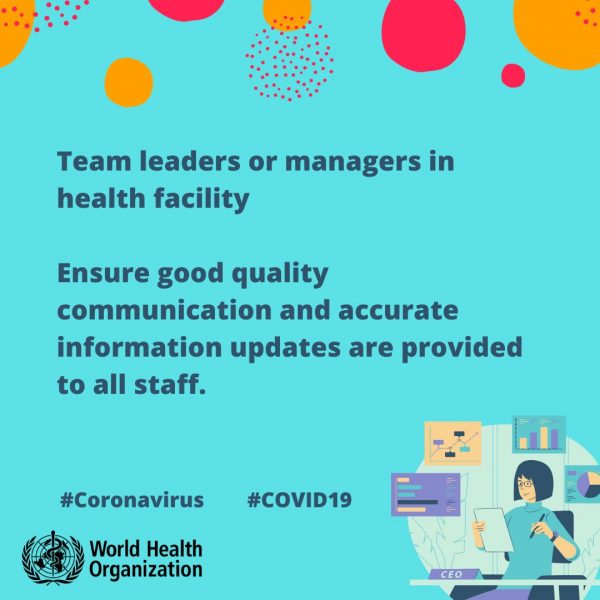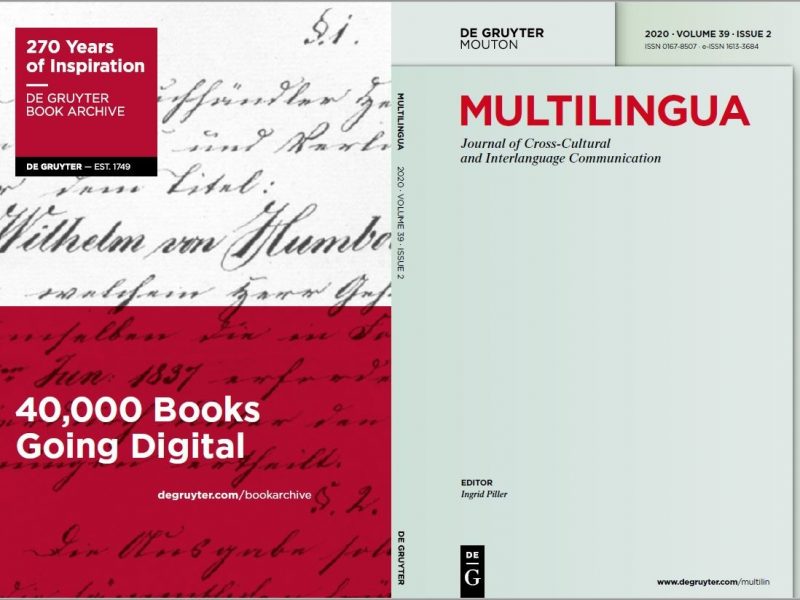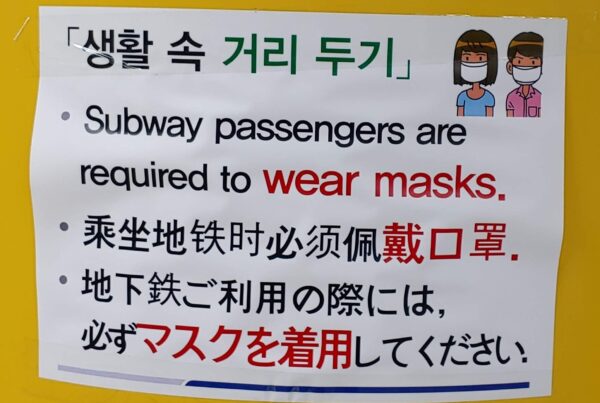 Call for papers for a special issue of Multilingua devoted to “Linguistic diversity and public health: sociolinguistic perspectives on COVID-19” edited by Ingrid Piller, Jie Zhang, and Jia Li.
Call for papers for a special issue of Multilingua devoted to “Linguistic diversity and public health: sociolinguistic perspectives on COVID-19” edited by Ingrid Piller, Jie Zhang, and Jia Li.
The communication of public health information is a key aspect of the containment of contagious diseases. In fact, communication has been such a major aspect of the ongoing COVID-19 pandemic that it has been said to be accompanied by an “infodemic”, where many populations do not have access to sufficient reliable information while simultaneously being swamped with misleading information.
Public health professionals agree that, during an epidemic, the availability of timely high-quality information is vital, not only for the general public but also health professionals and decision makers at all levels.
Language barriers may compromise the timeliness and the quality at which public health information is accessible to linguistically diverse populations, at global, national, and local levels.
The World Health Organization’s (WHO) dedicated information website on the novel coronavirus disease, for instance, is available in the six official UN languages Arabic, Chinese, English, French, Russian, and Spanish. The same is true for Google SOS Alerts, and these are now being expanded to other languages.
WHO information is directed at member states, who are tasked with localizing relevant information for their populations through their national health authorities. States have taken a wide variety of approaches to the needs of their multilingual populations, ranging from staunchly monolingual communications (such as a White House directive to remove bilingual English-Spanish public health posters) to evolving multilingual and multimodal approaches as the needs of diverse groups have been increasingly recognized in China.
While states are key actors in this crisis, the failure of many state actors or a lack of trust in them has also resulted in numerous grass-roots approaches – both inclusive and exclusive. Linguistic diversity can become the site of exclusion in discriminatory non-state language policies such as those of a Hong Kong restaurant only serving Cantonese- and English-speaking patrons but not Mandarin speakers. At the same time, COVID-19 has also resulted in an outpouring of volunteer translation efforts to make key information available as broadly as possible, as is evidenced by the growing list of translations of the popular Medium article “Coronavirus: Why you must act now”.
 Call for papers
Call for papers
Against this background, we are calling for research submissions from sociolinguists engaged with the language challenges posed by COVID-19 in any context. We are interested in what the public health information needs of multilingual populations are and how these needs are – or are not – being addressed.
This special issue of Multilingua is based on an ongoing mini-series of research blogs on Language on the Move:
- Li Jia, Coronavirus meets linguistic diversity
- Gegentuul Baioud, Fighting COVID-19 with folklore
- Zhang Jie, Racism hinders the fight against COVID-19
- Yu Lha, Fighting the coronavirus in local languages
Timeline
April 06, 2020: Abstract due to the editor (ingrid.piller [at] mq.edu.au)
June 08, 2020: Manuscript submission due through Multilingua’s online submission system
August 10, 2020: Peer-review and production process; rolling virtual publication ahead of print upon acceptance
September 2020: Publication of print issue, 39(5)
 About Multilingua
About Multilingua
Multilingua is a refereed academic journal publishing six issues per volume. It has established itself as an international forum for interdisciplinary research on linguistic diversity in social life. The journal is particularly interested in publishing high-quality empirical yet theoretically-grounded research from hitherto neglected sociolinguistic contexts worldwide.
- Provides an international forum for interdisciplinary research on linguistic diversity in social life
- Facilitates exchange of information and experience between academics and practitioners
- Focuses on neglected sociolinguistic contexts worldwide
- Features special issues allowing in-depth exploration of specific topics
Topics
- Bi- and multilingualism
- Language education, learning, and policy
- Inter- and cross-cultural communication
- Translation and interpreting in social contexts
- Critical sociolinguistic studies of language and communication in globalization, transnationalism, migration, and mobility across time and space
 语言多样性与公共卫生:新型冠状病毒的社会语言学研究
语言多样性与公共卫生:新型冠状病毒的社会语言学研究
国际语言学核心期刊Multilingua 现以“语言多样性与公共卫生:新型冠状病毒的社会语言学研究”为主题组织专刊征稿,组稿人Ingrid Piller, 张洁, 李佳。
公共卫生信息的传播是控制传染疾病的重要手段。事实上,新冠病毒疫情全球蔓延的同时一直伴随着“信息疫情”。这场“信息疫情”使得许多民众无法获取充分而可靠的信息,从而被错误信息所误导。
公共卫生专业人士指出在疫情传播时期获取及时而高质量的信息十分关键,这不仅关乎普通民众,对医护人员和各级政策决策者也同样重要。
然而语言障碍可能会影响全球、各国和各地不同语言背景的群体获取信公共卫生信息的时效和质量。
世界卫生组织(WHO)设立了新型冠状病毒的信息网站,使用包括阿拉伯语,汉语,英语,法语,俄语和西班牙语在内的六种联合国工作语言传播信息。谷歌预警求救系统也采取了相同的信息传播措施,并且目前开始使用更多语言进行信息传播。
世卫组织面向成员国发布信息,而各成员国应通过国家卫生委员会为其民众提供相关本土化信息。目前,不同成员国对多语群体的信息需求采取不同的策略,有的采用强硬的独语传播方式(例如:美国白宫指示删除英语-西班牙语的双语公共卫生海报),有的如中国,随着不同语言群体信息需求认知的提升,逐渐形成多语种、多模态的信息传播方式。
国家是这次疫情危机的关键因素,但许多国家部门的不作为或公众的信任缺失也催生了许多基层应对措施 — 既有包容性的方式也有排斥性的方式。语言多样性也可能演变成一个社会排斥的场域,充斥着歧视性的非官方语言政策,如,某些香港的饭店只服务讲粤语和英语的顾客而排斥讲普通话的顾客。与此同时,抗击新冠病毒也激发了大量的志愿翻译服务,使得重要信息得以更广泛地传播。热门的文章“冠状病毒:为何现在就要采取行动”不断增加的译文版本,就是最好的证明。
 征稿启事
征稿启事
基于上述背景,我们向来自世界各地的社会语言学家征稿,以应对不同文化背景下新型冠状病毒所带来的语言挑战。 我们特别关注1)多语群体的公共卫生信息需求为何?2)以及这些需求如何得到或没有得到回应?
本专刊基于Language on the Move (语言在行动)研究博客的系列前期成果而形成:
- Li Jia, Coronavirus meets linguistic diversity ,《当疫情遇上语言多样性》
- Gegentuul Baioud, Fighting COVID-19 with folklore,《用民俗抗击新型冠状病毒》
- Zhang Jie, Racism hinders the fight against COVID-19,《种族歧视阻碍抗击新冠病毒》
- Yu Lha, Fighting the coronavirus in local languages,《用本地话抗击新冠病毒》
时间规划
摘要提交截止日期:2020年4月6日;联系人:Ingrid Piller (ingrid.piller [at] mq.edu.au)
稿件提交截止日期:2020年6月8日:请使用Multilingua期刊网上论文提交系统提交。
2020年8月10日:同行审稿,进入出版流程;一旦接收论文将先在线发表。
2020年9月:纸质版正式出版发行,39卷第5期。
 期刊Multilingua简介
期刊Multilingua简介
Multilingua是同行评议的核心学术期刊,每卷六期。该期刊已成为社会生活中语言多样性跨学科研究的国际论坛。期刊特别欢迎理论基础扎实并关注世界范围内被忽视的社会语言学议题的高质量实证研究。
- 为社会生活中语言多样性的跨学科研究提供国际论坛
- 促进学者和从业者的信息和经验交流
- 专注全球被忽略的社会语言学议题
- 以专刊为特色对专门议题展开深入探讨
议题
- 双语和多语研究
- 语言教育、学习和政策
- 文化之间和跨文化交流
- 社会环境中的翻译和口译研究
- 全球化、跨国主义、移民和跨时空人口流动背景下语言与交际的批评社会语言学研究
Download this cfp as pdf version:






 This work is licensed under a
This work is licensed under a
I can say that Australia handled the COVID information pretty well. While the official announcements, and information on https://www.health.gov.au/ site may be written in a quite formal way, there are in fact plenty of resources available in other languages and there are many posters to be printed out and displayed in many different types of business. Those posters include lots of pictures and they are easily understood by people with basic English language level and children.
Feel interested. I will submit my abstract.